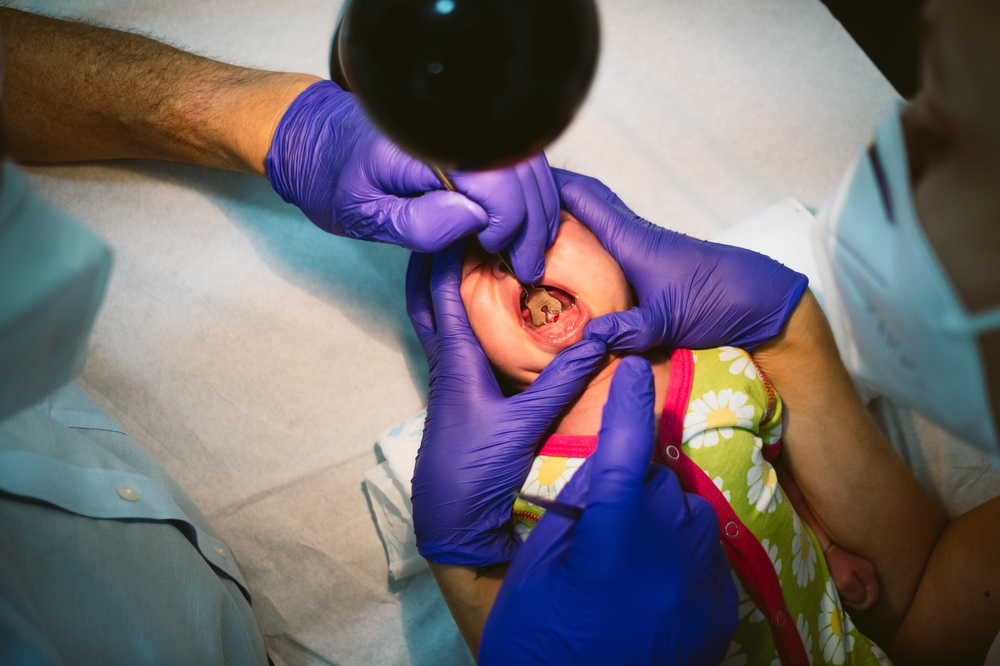
Frenectomies in Toronto
What is a Frenectomy and What Does it Treat?
A frenectomy is a dental procedure that treats tongue ties and lip ties in children. These are tight bands of tissue—called frenums—that can restrict the movement of the tongue or upper lip.
Tongue ties and lip ties can cause a range of issues depending on their severity. In babies, they can make breastfeeding painful or ineffective. In older children, they can contribute to speech delays, mouth breathing, and dental crowding. Treating the restricted tissue with a frenectomy can improve function and prevent longer-term problems.
The Frenectomy Procedure
The frenectomy procedure is simple and fast, but it works differently depending on your child’s age. At Kids Dental Group, we use a soft-tissue dental laser for all frenectomy procedures. The laser makes the treatment quick, safe, and effective, with less bleeding and faster healing than traditional methods.
For infants:
- The baby is gently held in a swaddle.
- A small amount of topical or local anaesthetic is applied.
- The laser is used to release the tight tissue in under a minute.
- Your baby can breastfeed immediately after the procedure.
For older children:
- We recommend working with a myofunctional therapist before surgery to prepare the muscles and improve surgical success.
- Local anaesthetic is used to ensure comfort.
- The laser precisely removes the tight tissue without cutting or stitches.
- Post-surgical exercises are needed to maintain the results.
The laser cauterizes as it works, which helps reduce discomfort and swelling after the procedure. Most children recover quickly and return to normal feeding or speaking soon after.
Should Your Child Get a Frenectomy?
Kids Dental Group recommends a conservative approach before deciding on a frenectomy. Not every tongue or lip tie needs surgery. We start by monitoring your child’s symptoms and function over time.
There are other treatment options that may be appropriate first:
- A lactation consultant can help with nursing issues caused by shallow latch or positioning.
- A bodyworker like an osteopath or chiropractor can assess and treat muscle tension or asymmetry that may affect feeding, speech, or growth.
For infants, a frenectomy can be especially challenging. Success depends on daily tongue and lip stretches to prevent the wound from reattaching. Babies can’t do these stretches on their own, which means parents must do them several times each day. This process can be stressful and difficult to keep up, increasing the chance that the tissue will reattach and the symptoms will return.
If your child does need a frenectomy, we’ll guide you through the decision and support you before, during, and after the procedure.
Are Frenectomies Safe?
Frenectomies are safe and low-risk when performed by an experienced pediatric dentist. At Kids Dental Group, our team is trained in procedures for infants and children, using equipment and techniques made specifically for young patients.
We use a soft-tissue laser, which allows for precise treatment with minimal discomfort. For newborns and infants, we use only topical or a small amount of local anaesthetic—no sedation is needed. For older children, we work with myofunctional therapists to help prepare for and support the healing process.
We take the time to answer your questions and explain everything clearly, so you can feel confident in your child’s care.
Aftercare and Healing
Proper healing depends on daily follow-up care. We’ll show you exactly what to do and provide support throughout recovery.
For infants:
- Breastfeeding immediately after the procedure helps stretch the site and prevent reattachment.
- Parents will need to do daily stretching exercises to keep the wound open while it heals.
For older children:
- Exercises taught by a myofunctional therapist are important before and after the procedure.
- Post-procedure exercises prevent scar tissue from forming and reduce the chance of needing a second treatment.
We will schedule follow-up visits to monitor healing and answer any questions you may have during recovery.
Don’t Diagnose at Home – Talk to a Pediatric Dentist
It’s hard to tell on your own if your child has a tongue or lip tie that needs treatment. Online photos or checklists can’t replace an in-person exam by a trained professional.
If you’re struggling with feeding issues or have concerns about your child’s speech, breathing, or oral habits, bring your child in for an evaluation. Our pediatric dentists can assess the situation and guide you on the best next steps.
Book Your Consultation Today
Kids Dental Group is always happy to help. Book your consultation today and get peace of mind from a team that puts your child first.
